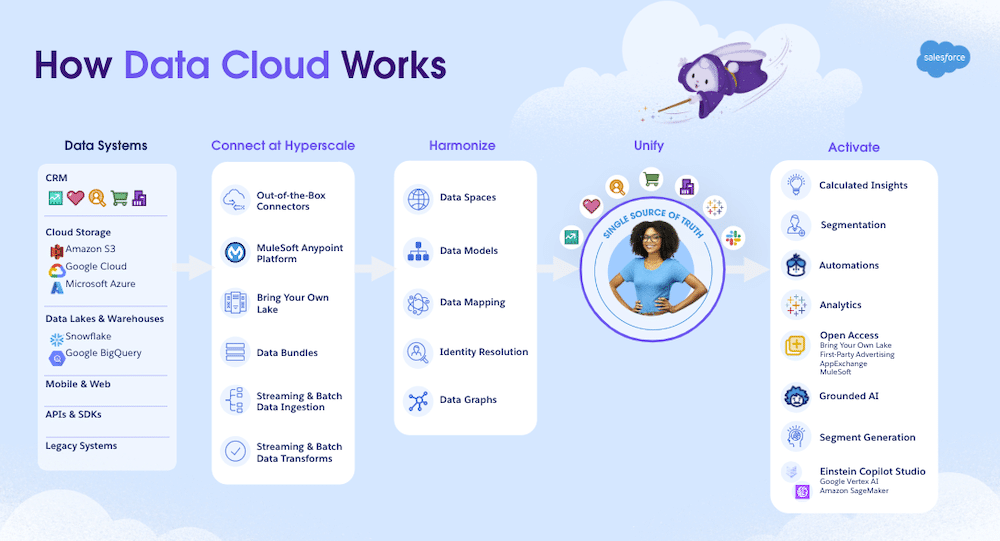Research from the McKinsey Global Institute indicates that businesses utilising integrated data have a 23% higher chance of acquiring customers and a 19% greater likelihood of retaining them. In contrast, companies with fragmented data experience operational inefficiencies, lower customer satisfaction, and hindered innovation.
This article delves into the effects of data silos, the opportunities they are costing you, and strategies to dismantle them to harness the potential of your data fully.
Understanding the Problem: What Are Data Silos?
Building a data-driven culture is one of the most important lessons organisations can learn today. Data provides a valuable opportunity to analyse and make strategic decisions based on concrete information.
As discussed in the article “Why You Need a Data Culture to Empower Your Business Potential” this approach minimises the risks associated with assumptions and guesswork, leading to better performance, cost savings, and a more potent competitive edge.
However, it’s essential to recognise that data is only as valuable as its quality and the ability of people to utilise, analyse, and derive insights from it effectively. To achieve this, companies need to invest in fostering a culture that incorporates data governance into their daily operations and decision-making processes.
According to the 8th Edition State of Marketing Report from Salesforce, “33% of respondents acknowledged that unifying data sources were a challenge,” highlighting the primary obstacle to becoming a culture-driven organisation: data silos.
Data silos occur when information is compartmentalised within the organisational structure, such as among different teams, product units, or job functions, where departments like sales teams use their tools and processes without integration. This creation of multiple data sets instead of one integrated source of information often arises unintentionally as organisations grow, and it restricts the effectiveness of data management and the potential value that can be extracted from an organisation’s data.
Breaking Down Data Silos
Data silos usually arise from a mix of technological and organisational issues. One major factor is the use of disparate systems, as companies often depend on different software and platforms that fail to integrate or communicate effectively.
Organisational barriers play a role too, with organisational structures working in isolation and having little motivation to share information with other teams. Moreover, the increasing dependence on multi-cloud environments makes the problem worse, as data gets spread out across various providers, making it harder to consolidate.
The Impact of Data Silos
The issues caused by data silos are extensive. Disconnected data leads to inconsistencies that compromise accuracy, and teams experience delays in making decisions as they work to align conflicting datasets. These inefficiencies can also negatively impact customer service experiences, as the absence of consolidated data hinders businesses from comprehensively understanding and responding to the customer journey. For instance, a marketing team may plan its campaigns using outdated purchase data, not realising that it is not synchronised with the sales team.
Why Data Silos Are Costing You Opportunities
Data silos not only disrupt internal processes but also have a direct impact on business growth by making it difficult to access and visualise data, increasing costs, and leading to inefficiencies.
One major consequence is the loss of valuable insights. When data is fragmented it creates multiple data sets and important patterns and trends can go unnoticed, preventing businesses from seizing opportunities for innovation and strategic advantage. This lack of a comprehensive view can lead to poor decision-making and a lack of long-term growth, as it becomes challenging to access all necessary information. Let’s consider a national postal service as an example. The marketing department has observed an increased interest in eco-friendly delivery options, yet it lacks access to operational data on delivery performance. Meanwhile, the logistics team focuses on optimising delivery routes for efficiency, but remains unaware of the increasing demand for sustainable practices. The absence of coordinated action and shared insights hinders the company’s ability to adapt its service offerings to meet these evolving demands, leading to a potential loss of market share and a missed opportunity to position itself as a leader in sustainable delivery solutions.
Siloed data also obstructs personalisation, which is crucial for meeting modern customer expectations. Without a unified understanding of customer service preferences, businesses are left to provide generic interactions, resulting in less effective engagement.
Moreover, incomplete customer profiles can lead to revenue loss, as companies may miss out on upselling or cross-selling opportunities. For instance, failing to recognise repeat customers across different platforms could mean missing chances to encourage loyalty. JP Morgan reveals that data silos cost businesses an average of $3.1 trillion annually in lost revenue and productivity.
Additionally, siloed data diminishes the effectiveness of AI and analytics. Machine learning models depend on large, high-quality datasets to produce meaningful predictions and recommendations, and fragmented data limits their potential. The efficacy of AI agents, such as Salesforce’s Agentforce, is contingent upon their access to clean, integrated, and contextual data. When data is fragmented across numerous systems and stored in unstructured formats (e.g., PDFs, videos, and support tickets), AI agents encounter difficulties in retrieving pertinent information efficiently. This data fragmentation results in disjointed insights and impedes the agents’ capacity to make informed decisions, ultimately diminishing their effectiveness.
Centralising data instead of having data sets enables all departments to streamline their technology stack, reducing administrative and maintenance costs. It also allows leaders to gain a comprehensive view of the organisation, minimising duplicated data and inefficiency while fully leveraging AI capabilities to make informed, data-driven decisions.
Strategies to Consolidate Data and Break Down Silos
A Centralised Data Platform
A key solution is implementing a centralised data infrastructure such as Salesforce Data Cloud. This platform combines data from various sources into one cohesive system, offering a single source of truth. With smooth integration across all areas of the organisation, Salesforce Data Cloud allows for consistent, real-time access to valuable insights.
Learn More in these Stellaxius’ articles:
- From Data Silos to Single Source of Truth: How to Unify Customer Data
- What to Know Before Choosing Salesforce Data Cloud

Standardising processes
Effective data governance and standardisation are essential for breaking down data silos. Organisations need to create clear policies for data collection, cleaning, and management to ensure accuracy and compliance with privacy regulations like GDPR or CCPA. By standardising data formats, businesses can enhance integration within Salesforce Data Cloud, fully utilising its capabilities.
Collaboration for Long-term Success
Equally crucial is promoting collaboration across departments and all organisational structures. Overcoming silos involves more than just technology; it requires a cultural transformation. Encourage teams to pursue common objectives by initiating cross-functional data projects and utilising Salesforce’s collaborative tools. Designating data stewards in each department helps maintain accountability and ensures consistent data practices throughout the organisation.
Integration of External Data Sources
To truly harness the power of a centralised platform like Salesforce Data Cloud, consider incorporating external data sources such as third-party APIs or market trend datasets. This approach enriches the organisation’s data repository, offering a more holistic understanding of customer service behaviour and market trends.
Continuous Training and Upskilling
Creating a data-driven culture means investing in employee education. It’s essential to offer ongoing training so that teams can effectively utilise Salesforce Data Cloud. By enhancing employees’ skills in data analysis and visualisation tools, you promote greater engagement with data and inspire innovative thinking.
Regular Data Audits and Optimisation
Implementing regular data audits is crucial for keeping the centralised platform accurate and relevant. It’s important to periodically evaluate data quality, remove redundancies, and optimise the structure within Salesforce Data Cloud to ensure a high-performance system.
Real-World Examples and Success Stories
FedEx: Data Cloud brings web, shipment, and account data together for more effective sales follow-up.
FedEx utilised Salesforce Data Cloud to tackle issues related to fragmented data, which made it difficult for them to effectively reach out to inactive B2B customers and handle abandoned shipping quotes. By consolidating their sales, marketing, and shipping data, they were able to access real-time insights that facilitated better customer service. This integration not only sped up follow-ups but also enabled targeted campaigns, leading to an increase in international shipping conversions and overall revenue.
With Data Cloud’s zero-copy integration and automated workflows, FedEx refined its sales strategies and improved customer interactions through personalised experiences, greatly enhancing lead qualification and re-engagement efforts.
You can explore the full story on Salesforce’s website.
Wyndham: Unified customer profiles help hotel owners and service agents personalise guest experiences.
Wyndham addressed the issue of disconnected guest data by implementing Salesforce Data Cloud to consolidate profiles from its reservation, loyalty, and CRM systems. This integration empowered agents to tailor booking experiences, leading to increased customer satisfaction and higher revenue per agent. By leveraging AI-driven tools such as Einstein Service AI, Wyndham was able to cut down call centre handling times and anticipates a 35% reduction in case resolution time. This efficient process not only improved guest engagement but also boosted profitability, allowing Wyndham to foster direct relationships with customers and avoid reliance on third-party booking platforms.
For further details, visit the full story here.
The Road Ahead: Future-Proofing with Unified Data
In today’s rapidly changing technological environment, embracing a data-first culture is crucial for businesses aiming for long-term success. Salesforce Data Cloud provides a solid foundation for future-proofing strategies, allowing organisations to stay ahead through advanced data management and analytics capabilities.
AI-powered data integration
A vital strategy is AI-powered data integration. By utilising the AI features of Salesforce Data Cloud, businesses can automate the consolidation of data and reveal hidden patterns within datasets. This enables organisations to make quicker, more informed decisions based on thorough insights.
Real-time insights
Another important aspect is real-time insights. Salesforce Data Cloud delivers up-to-the-minute data, facilitating agile decision-making and ensuring that businesses can swiftly respond to market shifts and customer demands. By adopting these strategies, organisations can create a resilient, data-driven future.
Final Thoughts
At Stellaxius, we focus on assisting organisations in overcoming data silos and realising their full potential. Our customised solutions allow businesses to centralise their data using innovative tools like Salesforce Data Cloud and break down problems like data silos. By leveraging AI, we help organisations discover valuable insights and enhance decision-making.
Data silos are not just a technological hurdle; they pose a significant obstacle to business growth and innovation. By consolidating data, utilising CRM analytics, and promoting collaboration, organisations can transform fragmented information into actionable insights.
The time to take action is now. Breaking down silos is not only about boosting efficiency—it’s about ensuring your business stays competitive in an increasingly data-driven landscape. Are you ready to revamp your data strategy? Stellaxius is here to help you achieve that.






